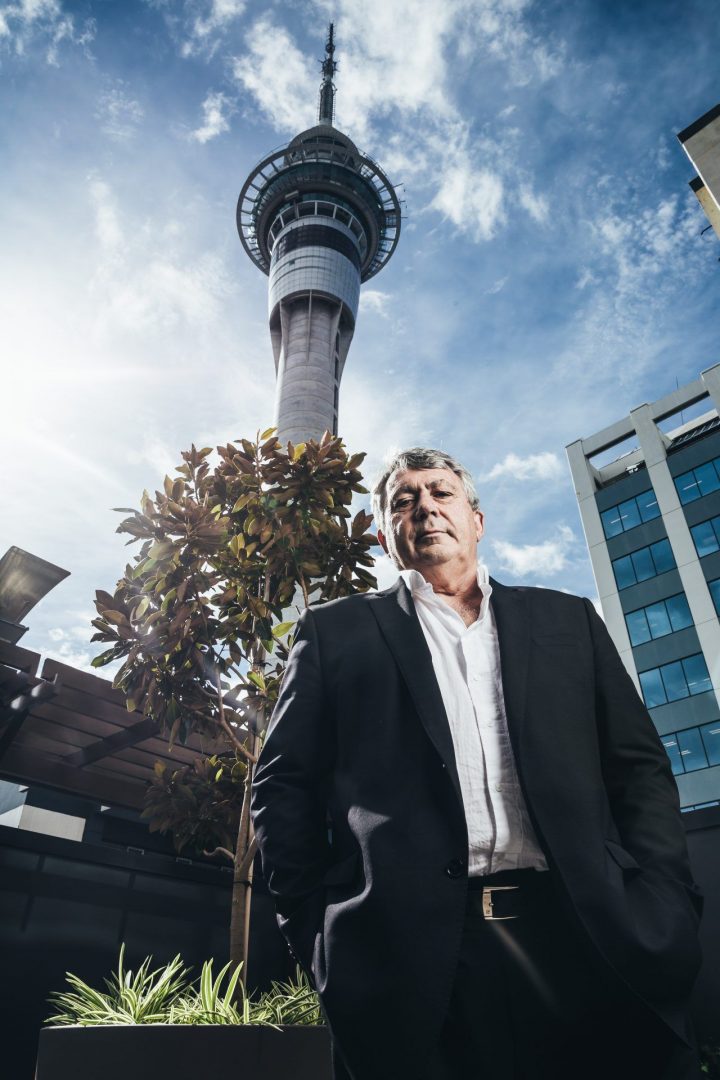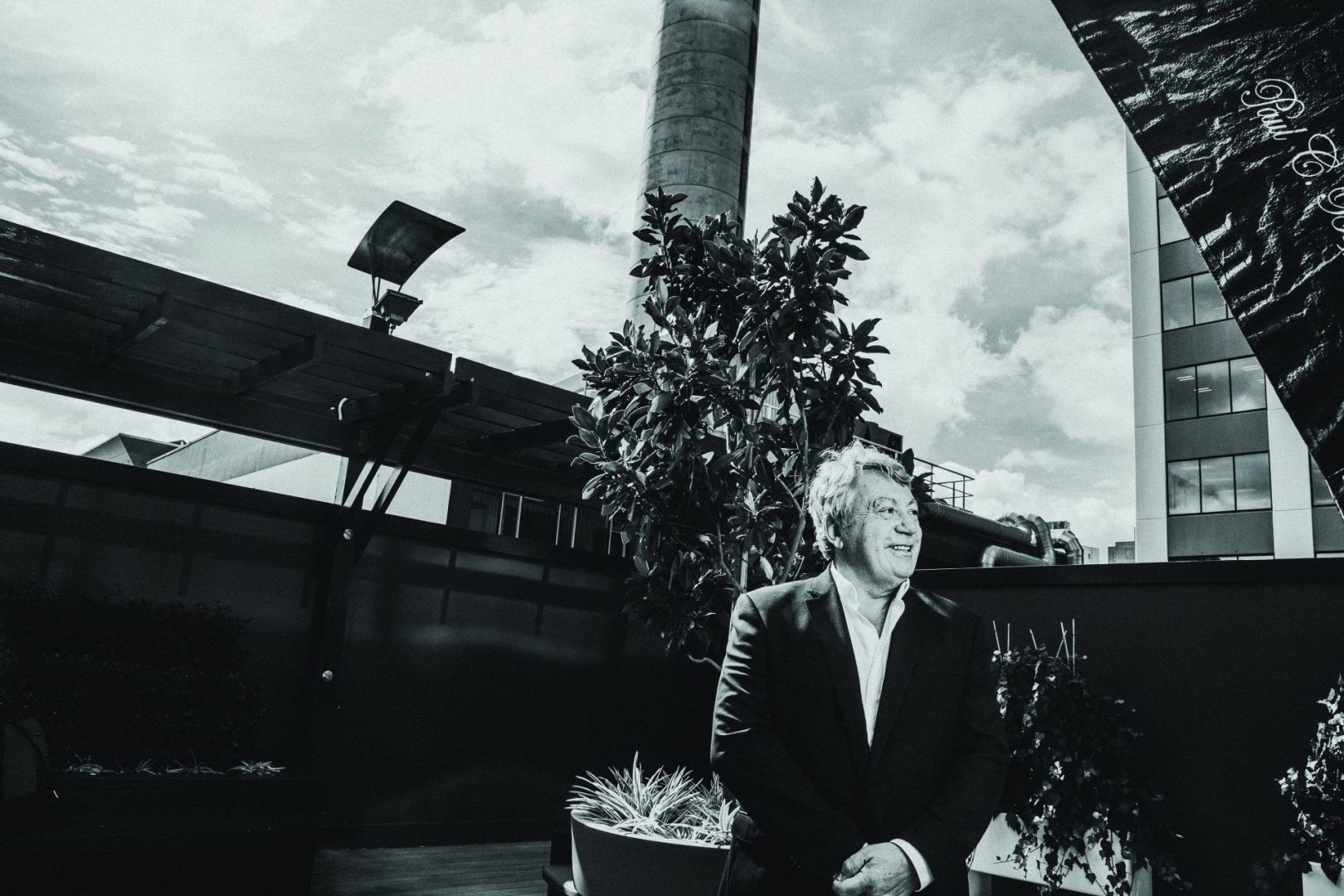Why One Business Model Doesn’t Fit All
Much has been written about Rob Campbell’s business journey; a former trade unionist who rose to become one of New Zealand’s leading professional directors, and his current work as chairman of the board for NZX-listed companies SKYCITY, Tourism Holdings, Summerset Group and Wel Networks. You can also add to that his years of experience in capital markets and advising a range of investment fund and private equity groups in New Zealand, Australia, Hong Kong, and the US.
Watch this interview here.
Plus, the fact that he was made a Companion of the New Zealand Order of Merit (CNZM) in the New Year Honours 2020 list for his services to business. What is probably more impressive about Rob though is his support and generosity in terms of community groups, young entrepreneurs and ideas that are forming the foundations for new models of enterprise that create fairer opportunities and have stronger environmental and socio-economic considerations in place. We talk to Rob about the future of the New Zealand economy and how one model doesn’t fit all.
Talking about New Zealand, within the context of the world, is it a zero sum game? Are we going to come out better off while other markets really suffer?
I think New Zealand is in a uniquely strong position, frankly. Bits of luck, bits of good management, bits of good leadership, but you need all of those things going your away. I think we largely have had them and still still have them. Domestically, I think we’re in quite a strong position. We’re not quite recognising it yet that we are a poorer country than we were before this.
I think that’s probably a next step that we have to take, not to think that we simply reinstate everything to where it was because that won’t happen. But we need to adapt to the fact that we’re a generally poorer country, but we have a society and an economy which is functioning again.
We can grow domestically significantly. We can continue to grow exports in many areas of our economy. Tourism is clearly a difficult one and it may well not return for a very long time to anything like its previous role. It may never in fact return to its previous proportionate role in the economy, but we do have the opportunity to continue to try.
One of the really interesting challenges in New Zealand will be what we do about migration at the moment. We’re overwhelmed by temporary migration, both going in and going out. But, in the last 20 years, New Zealand has primarily grown its economy by putting more people into it; more people do more things and eat more things.
So GDP goes up, but that productivity hasn’t improved much. I think that’s a really important challenge for New Zealand, not to revert to simply pumping up the economy with people and doing more of the same things. Instead improve the quality of what we do, the quality of how we do it and the quality of how we distribute the outcome, but all of it within the context of an economy that is a bit poorer than it at least seemed to be a few months ago.
In one of your recent LinkedIn posts there was a point you made that we are all going to be impacted by this. Some people at the top of the ladder might lose their sea view, but there’ll be people at the bottom of the ladder that are going to be underwater. Do we have the tendency to forget about the people at the bottom of the ladder and what we need to do to help them?
That is my view. I think that the business world that I exist in, we tend to think about our business, what we’re paid to do, but perhaps not think more broadly. It’s patently obvious to me that the bottom of our society, be the migrant labour or be they other working class people, one or two of whom in the family has lost a job.
Those people are significantly worse impacted than someone whose house value has fallen by X amount, or who can’t have that overseas trip they thought they were going to have. It is that way I think.
Quite interesting today to see the Green Party talking about quite a comprehensive package of assistance to those that need it. In fact, it’s not all that radical. Most of what they said is what was in the working party the current government established on welfare and benefits, which delivered a report that largely disappeared because it was aimed at the people who are at the bottom and they don’t squawk as loud or get hurt as well as the people at the top.

I have no doubt in my mind, the food banks, everything else that you see tells you that there is real struggle going on for many families in New Zealand at the bottom end. It’ll be a test of our resilience and quality as a society how we deal with that.
How do you reconcile it? Is there a cold-hearted capitalist inside you that thinks if we create the business and the opportunities, then that will lift everyone up and if we create too much of a safety net, then that will encourage people to not be productive?
No, I don’t believe that that’s the case. Incentives do matter. One economist once wrote that that sort of economics can be summed up in that; incentives matter, all the rest is just commentary. I recognise that, incentives do matter to people, but they’re not all just financial incentives.
People are incentivised by the family and the culture, incentivised by their communities and by the various kinds of return that they get to being alive, being part of humanity.
You can’t avoid the cold calculus of economic light. That is true, but you don’t have to totally obey that cold calculus. I think the calculus, if you like, is a fact of life, but I don’t think we have to carry it in our hearts. I think that our brains are more than capable of adjusting for some of the implications of that calculus.
You can sense that we are even changing some of those metrics. A lot has been spoken about donut economics. Are we starting to look at the other metrics for productivity in a healthy society, in a productive society?
I think there has been in the last probably 10 years, certainly since the GFC, something of a resurgence of thinking of what you might call social economics, and some of it socialist economics, as people have perceived some of the difficulties of the earlier neoliberal economics and the governance structures associated with that.
I think there has definitely been an intellectual resurgence of that wider view and, probably donut economics is one of the more recent manifestations of it and quite a strong one. I think there’s also been within the economics profession, a really interesting recognition of the positive role, which the state has found in innovation, which is changing a lot of the narrative that everything that’s been achieved technologically in the last decade was as a result of a scrawny, white teenager in a university campus, somewhere in the United States.
We need to recognise that, in fact, a lot of that is built on university research, government research, less attractively military research, but nevermind that there’s been a strong state element in that. I think a lot of that narrative of economics is changing. You can see that in the way that governments are responding and the way that international institutions are responding.
The flavour and the narrative of the World Bank or the OECD, or even central banks, has changed quite a bit. That’s a good thing. It’s nice to think we can progress a little bit in that the world might look a little bit different than it did when Adam Smith was writing. That is happening to some extent and I expect it to continue.
I saw another of your LinkedIn posts today where you were talking about McKinsey and how often business consultants are used as a little bit of a scapegoat in terms of some of the decisions, but you’re talking about the need for boards and executives to actually take responsibility for some of those decisions.
A colleague today, who’s quite fond of gambling, read that same post and said, ‘You got the analogy wrong. What they really are is the bunny on the greyhound track, the business is just chasing them around, but they set out there to lead the way and told what to do.’ It’s electronic money these days.
I’m concerned as a business person to have us be more transparent and more honest about what is going on and I do think that we’re quite bad about that in business. I think we do use consultants to justify decisions that we know we need to make anyway and point, and I think that’s a bit lazy and a bit dishonest. I also think that the same thing happens in other areas of our business where we know things need to be done.
The one that strikes me most at the moment is the special pleading with the government. We say, for example, New Zealand needs to open up its borders. What we actually mean is my business will be better if New Zealand opened up its borders.
We must build more roads because this will create more jobs. What we really mean is, I’m in the roading business and I would like us to do that. I think it’s important for people who are within business to sometimes call those things out.
For example, in my life, and I apologise in advance to shareholders from SkyCity or Tourism Holdings, our businesses would get a significant short-term sugar rush from the borders being opened to overseas tourists. On the face of it, that would be quite a good thing for us, but I don’t think we should do it. I don’t think it would be good for our local community.
As it happens, I don’t think it will be good in the long term for our business, because that way lies disaster that we can observe all around the world where people haven’t treated this pandemic or other pandemics seriously.
One of the things that I think business has to do to maintain its legitimacy and should do anyway, because we’re human beings, is trying to be more direct and communicate more clearly what we think.
In terms of Tourism Holdings and SkyCity, you must have had to make some pretty tough calls in terms of the sustainability of the business at the cost of revenue and cash flow. What was that process like?
It’s not fun, but nobody cares about that and neither should they. I don’t want to sound callous, but these sorts of decisions are by no means the most complex decisions you make in business. When your customer flow drives up to zero, your range of optionality about the business decisions you could possibly make shrinks with it.
In fact, those decisions become, at one level, a whole lot more simple than they were when you seemed to have the universe of opportunity available to you to do clever things. When the crisis hits, there’s only one or two things you can do, it becomes relatively easy.
The human impact of it is not easy, but you simply shouldn’t be in these positions if you’re not willing to make decisions which are rational on behalf of your variable stakeholders to try and balance those interests and to try and produce an outcome that will leave a business activity going on.
If you take, for example in SkyCity, if we make bad decisions, lead it to crash and burn, which we’re not going to do, but if we did. If we didn’t downsize to recognise that a large part of our clientele has gone and isn’t coming back anytime soon, then the jobs that we put at risk are a great deal higher than the jobs we have already cut.
In the same way as the jobs at Tourism Holdings, where we’ve had to make job cuts as well. Fortunately, the boost we’ve given to domestic home motor usage has protected a number of jobs, but by no means all of the jobs. If we don’t have a viable business, there are many hundreds of other jobs, potentially thousands of jobs that would also be lost.
We’re not living in an ideal world. In the relative world in which we live, we’ve got to make those judgements. I feel okay about those. I don’t like running into people on the streets or anywhere else online who I’ve been the agent for them losing their job.
But it’s a damn sight worse for them and mostly I find that those people, even if they don’t like the impact on themselves, if the process has been reasonably fair, they are remarkably realistic about why it’s occurred.
People are pretty realistic about their jobs, they can see that there are no customers and they know the implication of it.

Have you got any advice in terms of how that process is done well?
I’m careful of giving gratuitous advice about these things. You’ve just got to try and make the decisions as sensitively and as fairly and as legally as you can, and all those things come into play. And then, as we certainly did in each of the businesses I’m associated with, look at what the result is and say, have we inadvertently done something here to excessively impact any particular group of our employees, be that by gender, ethnicity, disability, etc.
You’ve got to go back and run a sense test over it. You’ve got to recognise that you will make mistakes in all of that. Some of the outcomes won’t be as you had ideally wanted them. I think those are all things you can do.
I think, from what I’ve observed, you never know what’s happening in smaller companies, but major New Zealand companies have actually done this in a pretty fair and reasonable way. That’s the best that can be asked from them. Same way as when you’re employing people, you’ve got to do it in a fair and reasonable way.
There’s a lot of talk now about kindness in leadership and authenticity and a little bit of humanity. Have you noticed that there is an evolution, in terms of leadership?
I think the new generation of business management is a better generation than my one. I think that they have a wider social view of their role in business. I think they have a much wider environmental and sustainability view, which is genuine. It isn’t just a greenwash.
I think that the new generation of leaders who are in, let’s say their thirties and forties, are much more rounded, well educated, and aware and kind people, than the generation in their fifties and sixties, I only just sneak into that. It’s not to say that people of my generation are necessarily worse people as such, but we came up within a different structure.
I think you can already observe that amongst people who are coming into the workforce now in their twenties, or even late teens. I think their social values and expectations of the workplace are another quantum change that will be very important in the next few decades. As it should be, it’s their world.
For too long, I think we’ve thought that the world was best run by people who were due to shuffle out of it. In fact, ideally, I think we need younger people to make the decisions that will impact their lifetimes.
There’s so much knowledge that’s easy for younger people to dismiss. Do you sense that we are not as willing to take lessons from the people that have been through multiple recessions?
I grew up in a generation where The Who, in their song My Generation, were singing, ‘I hope I die before I get old.’ I think one of the other slogans that was very, very popular when I was at university was, never trust anyone over 30. I’m tempted now somedays to never trust anyone under 30.
Some of that’s just normal noise. I don’t think genuinely older people have too little say in what happens in our communities and in our businesses. I think it’s the other way. Occasionally, at my age and stage, you might feel that you have more to contribute than others do. I think as long as we’re respectful to one another and do listen.
If you take my life, I ended up giving quite a lot of speeches, probably give more than I listen to, which is a bad thing, but I give quite a lot of speeches to young people, and I don’t hear many young people giving speeches to me. I’m not concerned about that, I think the younger generation are entitled to be pushy. That is what they should be doing.
Is there something in particular that drives you at the moment?
I’m very fortunate in that I’m doing now that what really interests me. I find interest in intellectual challenge. I’m involved in various social projects, but they’re pretty much helping other people do their thing and maybe clearing a bit of debris out the way so they can make progress. I’m very much driven just by what I’m interested in.
How do you juggle everything?
I just do it in the order it comes across the screen, these days. Some weeks, I’m pretty busy. But, I don’t play golf, I actually don’t really have any outside interests other than what I do in the business and economic world. I don’t find it boring. I find it really interesting. I don’t get tired of doing that.
From one introvert to another, can you give me some advice for pushing yourself out there and seizing and creating opportunity for yourself?
I can give you advice as to what not to do because it did place psychological stress on me, which was to try and ignore the fact I was an introvert. Just accepting that the way in which you operate is okay and it won’t suit everybody, but it is the way you are.
There’re plenty of extroverts in the world, the annoying buggers that they, but there’s plenty of them. So you don’t have to add to them.
If you are feeling like you are limited, is it that we put too much expectation on ourselves for being a certain way?
I find it increasingly hard to judge other people’s lived experiences in that way. I do have quite a lot of conversations in recent years with young people, particularly those from minority ethnic cultures, but sometimes with women, who really do struggle with, how to be Samoan, or Indian or Chinese, or whatever it might be, in a business world, which is dominated by a longstanding model.
I’ve become aware very late in the piece, for which I apologise to all those people, that the issue is probably not finding people from minority ethnic cultures that fit into our business structures, rather that we should be focusing on making our business structures adapt to the people who are in Aotearoa New Zealand and making them fit for people from other cultures to work in.
This was pointed out to me a few months ago by a disability activist who was saying we should do this and that for the disabled community. And then made the point to me that we’re simply the physical manifestation of the barriers that your culture has put up to people of other cultures to participate in business.
They’ve all got steps they can’t walk up. That was a real insight to me to see it in that framework and to recognise that it was true and that those steps are around for people and they find it very difficult. In one of my businesses, we we participated in a very good program called TupuToa, which is bringing young Māori and Pasifika graduates into business.
A group that I met with from that program were, thankfully, very honest with me about what their experience has been within the businesses I’m associated with. They made the point that everyone expected them to be grateful, which they sort of were, but they had all experienced how uncomfortable it was, even with a degree and even with an expectation that the world of commerce was for them, to come and work in situations which they considered to be fundamentally racist or at least culturally difficult.
That really brought me up short and has made me think pretty hard about what programs we need to have and how we need to behave as businesses in a world where less and less of the population are white males.

Do you get the sense that that there will be a shift as well? That We’ll start to bring in some more values from certain indigenous cultures that have a very different mindset in terms of timeframes, etc.?
I certainly hope so. I do think so. At its most basic level, Te Reo Māori’s going to be more and more significant. I don’t think it’s so much that we’ll bring it in, it’s that they’ll force their way in. What I perceive is happening is that people who don’t feel that they can fit into the established corporate cultures are increasingly starting to do their own thing.
We are finding other types of business and economic organisation which does enable people to participate in a way that they feel is consistent with the person they are. I think they will grow, I think they will flourish and normal corporations, historic corporations, will struggle unless they adapt, because a lot of the really good talent, a lot of really innovative talent and nurturing talent will go to these other forms of nongovernmental, nonprofit, social enterprise, some of them vigorously for profit, but not the old corporate structures.
I think they will grow and take over. That’s a good thing. And because businesses of the old form will recognise that, we will adapt.
I was wondering if we will see more of that diverse playing field in terms of those structures, the business entities and the community groups. Do you see that we’ll start to shape our economy and the opportunities here as well?
I certainly hope so because to me, it’s the only conceivable model in which we can succeed as a whole community. For historic reasons, colonialism is such an intrinsic part of New Zealand’s history, but now we have such a diverse population, and we have opened the cork on gender equity and on equity around sexual orientation and on equity around differently abled people.
We’ve opened the cork of individuality and people’s ability to express themselves as they see fit. I personally think that’s a fantastic thing. Having done it, I don’t think we will ever successfully force people into one way of living their lives and I don’t think we should.
The best that can happen is that we have a society and a set of government rules and regulations, which allows as many possible ways of doing business to flourish as can be. I think that’ll happen because people will just do it anyway, but it’s better if we encourage it.
Do you think there will be the capital here to fuel it?
The nature of capital in my understanding of how the system works and in my experience is that, really great projects find capital. Capital doesn’t always find really, really great projects.
Sometimes it finds really bad ones, but really great projects do find capital. So no, I’m not concerned about that. I’d be much more concerned about the human and societal elements of it.
You mentioned productivity, how do we increase that? Is it really through the tech space and keeping money on the table in terms of exports?
If I knew, I wouldn’t be doing the jobs I’m doing. But I think the first thing is skills. We need to invest more in our skills and in the flexibility of our skills. We need to invest more in our communities so that they are strong and healthy and give more people the opportunity to express themselves fully.
That is more of a bottom up process, the skills things is a little bit all over the place. I do think we have to be very careful of creating or allowing monopoly structures to develop. I do retain the old capitalist view that competition tends to be good for increasing productivity and for delivering what people want.
I think we’ve still got work to do to create a more competitive economy. I think all of those things come into being. One of the reasons for that is that we want to be careful that we don’t have structures that suppress green shoots coming through.
You want to be sure that energy companies are not owned, operated and structured in such a way that new energy finds it hard to come through. We want to open up the optionality.
One of the critical concepts of economics to me is optionality. You need to succeed to improve productivity, you have to have a number of ways in which things can be done. It’s very seldom that there’s one way which is the right one.
Are you talking about regulations through the likes of the Commerce Commission?
I think the Commerce Commission does some good work, but we could undoubtedly improve the level of competition right through health, education welfare, as well as business. I don’t think that many of the current structures are necessarily the most fit for purpose and that we should allow other ways of delivery to come through.
Though it’s got faults, from my interaction with it, I do think that the conceptual structure behind, for example, Whānau Ora, is a really good thing for improving health outcomes. Those sorts of productivity improvements are really important, as well as those that are in business.
The regulatory structure in energy in New Zealand do not allow the ready introduction of new energy alternatives, many of which are well known and available around the world. Those aren’t encouraged to flourish.
Every sector you look at, it’s not hard to find blockages normally imposed in the interest of those with the strongest economic position to try and sustain that. The more we can take a view that we want to be sure there’s a competition going on for every part of everything we do in our lives. That’s in the interest of everyone to have that outcome. That’s how you get productivity improvement.

There’s infrastructure projects that we’re having trouble kickstarting here. Does that show weakness in our system here, in terms of creating those skills?
Some of those things maybe weren’t the smartest project in the world to start off with. I find it a bit disappointing that we are building new motorways and not building new light rail. They may be necessary in this particular situation, but I think it’s disappointing that, for example, the money that’s being spent at the moment on infrastructure isn’t being driven at it’s core by our response to the climate crisis.
Much of it has turned its back on that and said, ‘Oh yeah, that’s all true, but we’ve got to do this over here.’ I would much rather see that money being spent on the urgent water and energy and climate issues that we face.
I think there’s a misallocation there and I think that misallocation is driven really by the special pleading of interest groups who managed to get in the governments ear and make it seem as if they’re the only alternative.
Do you think that the climate has taken a back seat? Is it more about the economic fallout of COVID and the health side of things?
I think the mainstream media certainly have have had an inclination that way, but they do tend to move around to whatever the new bright, shiny, or horrific thing is. I guess there’s an element of people that want to go back within themselves when they perceive some new major risk, but it hasn’t gone away.
I don’t think it’s gone away as a concern of most people. I think it’s really capable of being galvanised with political leadership, but I do think it’d be interesting to see what emerges from this latest election that we’re going into now, as to whether climate change issues do come back to the forefront. I’m a bit inclined to think that they will.
A lot of people were talking about the new New Zealand and the reset, but as soon as McDonald’s opened up, we were there. Has there been a little bit of a shift in how we work and our priorities?
There almost certainly has been some sort of a shift, but I think it’s grossly exaggerated. Most people in their families have pretty much the same aspiration and expectation that they had before the crisis.
What we need to do in terms of policy is to create better opportunities for them to realise their objectives and to do so in a way that’s consistent with the planet as we know it.
Covid is really interesting in that it’s by no means the first, and it will be by no means the last, epidemic or pandemic that we experience in the world. These things will happen, they may well happen with increasing frequency and even severity. It’s a matter of what we do about them and the same is true of the various manifestations of the climate crisis.
There is a role for political leadership to keep calling that out. I’m hopeful that from the selection, we’ll end up with a government that is not perhaps having to balance quite as many competing alternatives around as the current one has had to.
Is there any silver lining in terms of how we will be in the future? Will we have more resilience, more efficient companies and more caring companies?
There is a lot of restructuring and rationalisation of business still to be done and it will mean that, without doubt, there will be further job losses of genuine substance before we’re through this crisis. The issue is what we’re doing on the other side of that.
Are we creating new opportunities for business to flourish and for people to get jobs or otherwise participate? No one knows how long the helicopter money can go on. My old economics textbooks tell me it should have generated huge inflation, even by now, it clearly hasn’t.
There are various ways in which that can be done. I don’t think we should feel helpless in the face of this. There may well be more ability for governments and central banks to go on supporting economic activity and social welfare than perhaps we previously have given credit for.

The old horse that ran our economy for a long time certainly had blinkers on because that old horse didn’t even know you could do these things. We do know that you can do them now.
Are they wise? Well, so far they seem to have been. We’ve been able to avoid a lot of hurt. My economic logic would tell me that eventually you get inflation or you get some other form of reaction to this.
One of the options of course is the really ancient history one of the debt jubilee, where debts that can’t be paid, simply aren’t paid and they’re wiped off. Everyone laughs at that now and says that could never happen and I’m pretty sure they did 10 years before every debt jubilee in human history, particularly the ones who had loaned the money, if not the ones who had borrowed it.
There are all sorts of alternative ways to run our economies and run our lives, so I don’t see any reason to be despondent about having to come to an end and hit a cliff.
When was the last debt jubilee? It sounds kind of fun.
Oh, it’s certainly hundreds, possibly thousands of years ago and my history doesn’t go on that long, but there is quite a history of these things happening.
Can you conceive of negative interest rates at all?
Well, I’m going to have to, I think, because they have happened. I find it very difficult to conceive of, because it’s not within my experience. There are some really complex things that happen when you pay people to look after your cash.
Just this morning, I’ve been involved in a really fascinating discussion about what happens to interest rate hedges if interest rates turn negative and you have to make good to the bank.
You may well find out that your hedge becomes exactly the opposite of the hedge in an environment where interest rates turn negative. There’s some interesting arithmetic and things to resolve around that. We don’t know what will happen with that, but it doesn’t mean it can’t happen.
It’s like the oil thing as well. You had a particular market place where they couldn’t get rid of barrels of oil.
That’s right. Human life is not always to longterm benefit, but it’s extremely adaptable and lots of things that we couldn’t envisage working turn out to be able to work. Lots of things that we think as human beings will last forever simply don’t.
I spend a reasonable amount of time thinking and reading and listening to Buddhist work. The really critical thing in Buddhism is the concept of impermanence, that once you really understand impermanence, that nothing’s permanent, including you, you open your mind to a much wider range of possibilities than perhaps we force ourselves into.
Is there a certain type of person that you think that really thrives in uncertainty and they will be the people that can create the opportunities?
There are people who thrive in uncertainty and they’re often the worst bastards. Just because you thrive in uncertainty, doesn’t mean that you’re good or helpful to the rest of humanity, you can exploit uncertainty as well. I did read a really interesting thing the other day with a writer saying hope and uncertainty go together.
If you have certainty, you don’t need hope, hope doesn’t even arise. Hope only arises because of uncertainty. In this uncertain world, hope is a rational kind of reaction to that.
Certainty is more often likely to cause despair, unless it’s of course it’s the certainty that you’re going to be rich and live forever. Uncertainty and hope are twins, so let’s keep them both going.
We’re getting really deep. Have you got hope?
There’s not a lot of hope for me in a sense. I had a pretty decent inning’s, but I’ve certainly got hope that the world goes on and in a wonderful way that new people and new beings will experience and enjoy.
Where do you see the green shoots of opportunity? Obviously tourism is fairly hammered at the moment, but do you see that there is potential there to maybe reframe some things as well?
There will be. I currently find it hard to see and it’ll be new people that find the way that works. In New Zealand, the really interesting opportunities are in new forms of energy production and distribution and sharing.
I think there are enormous, interesting possibilities there. Also in the field of regenerative agriculture, where I think there are enormous and exciting opportunities for this country to be a global leader.

They involve a lot of science, they involve a lot of innovation and experimentation. I don’t see any reason why New Zealand, particularly in the space we’ve carved out for ourselves in today’s world, can’t become a real major leader in those things. That’s where I would look if I was going to be around for another 50 years.
We have so much capability here to be able to draw on technology, to build some of the foundation for that green economy that you’re talking about.
I do think that one of the assets of Aotearoa New Zealand is the global diaspora of people from this country, either coming back here or continuing to refer to here as being their homeland. I think it’s an incredible asset that New Zealand has that’s perhaps undervalued by New Zealanders.
Is there a little bit of psyche? Is that a Tall Poppy thing?
I don’t know, I think it’s a bit of a myth personally. I don’t think we’re particularly bad at that in New Zealand. We’re okay at celebrating people who do well, people like Taika Watiti, Israel Adesanya.
A whole range of people and cultures that I don’t even necessarily have any close association with. I think they’re recognised and encouraged and admired. I don’t think we’re any worse than anywhere else with that.
I wonder if we need to also spend some more time celebrating the people in our communities doing stuff. There’s some really cool stuff happening around the place.
Absolutely. We have potentially really, really strong communities in New Zealand that are diverse and are very committed to this country and to making this country their home. To thrive here and thrive alongside other people, rather than exploiting other people and taking over other people. That’s a fantastic strength and opportunity.
The renaissance that is clearly going on in the Māori economy and in Māori society is a fantastic thing to see. I do see a lot of that around and interestingly, those things don’t actually need a lot of support, because what is called support is often forcing a plant to climb up a trellis fence that you constructed in your own image.
Often all that those communities need is a very simple resource of some money. They know what they need, they know how to do it. They want to do it a different way.
What they find it really hard to do is to adapt to the majority culture way of doing things. Dave Letele and the BBM movement are an example I’m close to, by luck. But there are many, many others all over the country doing comparable things.
I wonder if in times like this whether there’ll be a whole lot of undervalued assets and where the people who are liquid can come in and buy them up. Do you see that as being an issue? Once it settles, that gap between the haves and the have nots is even wider than it was before.
I think it’s definitely one of the potential outcomes of this situation we’re in. Those of us that are in the more luxurious positions and more protected positions in life really want to think pretty hard about the sort of society that we want to live in and want our kids to live in and want our grandkids to live in.
I don’t think many people, if they sit down and think about that, would want to have a more stratified, more unequal society. If you don’t want to have it, you’ve got to do something about it. You’ve got to avoid that car crash.
When you look around the world, there’s plenty of places where that car is crashing. It doesn’t mean we have to, but it means we have to do something to avoid it.
What do you do about that?
I think the first thing we’ve got to do is properly see and hear the other people. I don’t think you can do it just by saying, ‘Oh yeah, that’s a huge problem. Let’s go and do that.’
There was a very good speech by Peeni Henare in Parliament just recently. He was telling people in the Opposition that as a Māori, the other people didn’t see him.
It was a very powerful phrase because the more he talked about it, the word ‘see’ was quite big. They could see him there at one level, but at another level he wasn’t being seen or heard as a Māori.
I think that the first thing we have to do is to really see and hear each other and put some real effort into recognising that we are all different, we are all valuable and we all have equal amounts to contribute in different ways.
It’s getting that thought leadership that I think is the most important thing. The danger is that we just rush out from our own current cultural class viewpoint and think, ‘That’s a real problem, we’ve got to do something about that.’ We would just go out and impose some other system that doesn’t suit everyone.
I know the Prime Minister talks a lot about needing to have a conversation about things and sometimes people roll their eyes. But the truth is, unless you are hearing and seeing one another, you won’t find the right answers to those issues. You’ve got to start with that, so we should keep having it.
Is there a snippet of optimism that you can leave us with?
Well, the funny thing is I think I’ve been quite optimistic in this discussion. I think there’s every reason to be optimistic because the alternative is too horrible to contemplate.
Watch this interview here.

